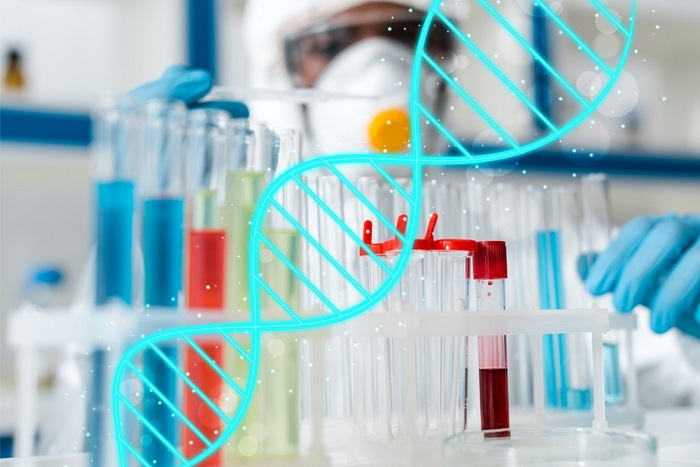
 Data Structure
Data Structure Networking
Networking RDBMS
RDBMS Operating System
Operating System Java
Java MS Excel
MS Excel iOS
iOS HTML
HTML CSS
CSS Android
Android Python
Python C Programming
C Programming C++
C++ C#
C# MongoDB
MongoDB MySQL
MySQL Javascript
Javascript PHP
PHP
- Selected Reading
- UPSC IAS Exams Notes
- Developer's Best Practices
- Questions and Answers
- Effective Resume Writing
- HR Interview Questions
- Computer Glossary
- Who is Who
Genes and Genomics - Integrative Cell Biology
Introduction
Genes can be defined as the basic unit of heredity. Genes can be defined as the small segments on DNA that are responsible for transmission of characters from one generation to other. The study of these genes and hereditary characters is called genetics.

The entire set of DNA that is present in an organism is called the Genome of the organism. Many organisms have genetic material that may not be necessarily DNA. For example, in some viruses the genetic material is RNA, they do not contain DNA in them. In addition to nuclear DNA organisms contain extranuclear DNA. The study of the entire genome of the organism is called genomics.
Correlation Between Genes and Genomics
The study of genes and their significance in the transmission of the characters from generation to other is called genetics. It basically focuses on the scientific research related to genes and the effect produced by them. What a gene does is providing blueprint for the synthesis of specific proteins which in turn guides other functions and metabolic activities of an organism.
Any alteration at genetic level leads to genetic abnormalities like phenylketonuria, cystic fibrosis, Huntington's disease, etc.
Genomics is comparatively newer branch of biology; it is similar to genetics but in broader terms it is the study of genes, is corelations with other genes and interaction of genes with their environment.
It involves the combined study of effect of genetic and environmental factors rather than studying only single gene. It focusses on some complicated diseases like diabetes, asthma, cancer, etc. As they are assumed to be caused by combined effect of environmental and genetic factors. A deeper study of such diseases can help in the discovery of their possible therapies.
From Genes to Genomes
The modern science of genomics now permits the study of DNA on a cellular scale, from individual genes to entire genetic complement of an organism. Genomic databases are growing rapidly, as one sequencing milestone is superseded by the next. Various techniques that are used in genomic studies are as follows-
DNA libraries provide specialized catalogues of genetic information
A DNA library is a collection of DNA clones, gathered as a source of DNA for sequencing, gene discovery, or gene function studies. The library can take a variety of forms, depending on source of the DNA. Among the largest type of DNA library is the genomic library, produced when the complete genome of a particular organism is cleaved into thousands of fragments and all the fragments are cloned.
As more and more genome sequences become available more specialized libraries are designed to study gene function.
Polymerase hain reaction amplifies specific DNA sequence
The human genome project along with the many associated efforts to sequence the genomes of organisms of every type is providing unprecedented access to gene sequence information. This in turn simplify the process of cloning individual gene for more detailed biochemical analysis. If sequence of a DNA segment to be cloned is known, it can be amplified many folds using a technique called polymerase chain reaction.
Genome sequence provide ultimate genetic libraries- The Human Genome Project
The genome is the ultimate source of information about an organism, and there is no genome we are interested in than our own. The International Human Genome Project started in late 1980s and completed in 2003.
A competing commercial effort to sequence the human genome was initiated by Craig Venter who made a different strategy called whole genome shotgun sequencing which eliminates the step of assembling a physical map of the genome.
Human Genome Project has changed scientific landscape for the new century and continues to improve and complete sequence of over 1200 organisms of all types is available. Broad efforts to map genes attempts to identify new proteins and disease genes and many other initiatives are underway.
Significance of Genomics and Genetics
Genetics is quite different from genomics as genetics is related to study of single gene whereas genomics emphasizes on the study of whole genome and interaction between different genes. It is undeniable that both play an important role on human, public health and mitigating global inequality.
Study of genomics help scientist and medical professionals to provide cost effective, efficient and robust diagnostic kits and medicines to developing and underprivileged countries.
Genomics and related technologies can help in improving the global health equity by exchanging the information regarding the existing technologies and services between developed and developing countries.
The Human Genetics programme has helped World Health Organization understand the challenges and opportunities associated with genomics and achieve its respective goals.
Human genome sequencing has great utility in catalysing the discovery of new proteins and processes affecting every aspect of biochemistry.
Conclusion
Despite many years of biochemical advances in genetics and genomics there are still number of eukaryotic proteins are still to be discovered also genomic studies tell nothing about the three-dimensional structure of proteins or their post translational modifications. The proteins with their myriad critical functions in every cell are now becoming the focus of new strategies for whole cell biochemistry and cell biology.

